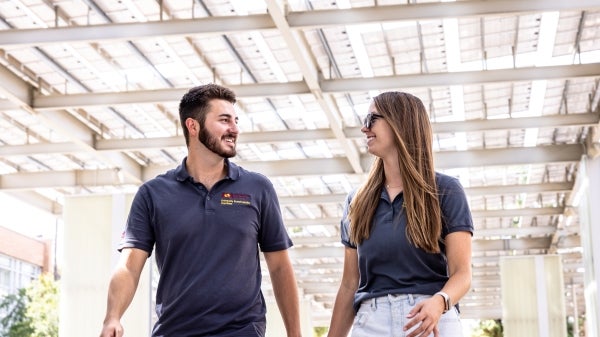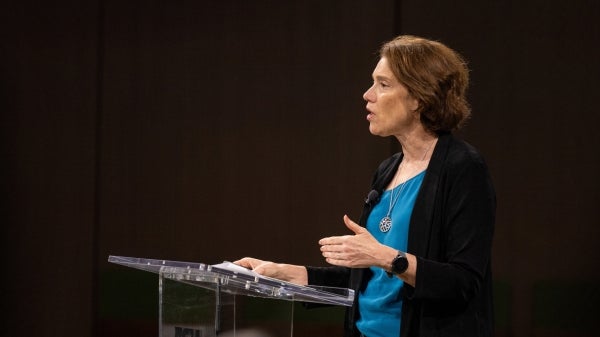ASU grad’s campus composting program inspired future career in sustainability

Courtesy of Taylor Bakeman
Editor’s note: This is part of a series of profiles for spring 2019 commencement.
Though she’s graduating in May with a degree in speech and hearing science, ASU senior Taylor Bakeman has been following a parallel passion in her time as a Sun Devil: sustainability.
The Chandler, Arizona, native started noticing sustainability issues on campus that she wanted to change — so she changed them. Most recently, the Vista del Sol community assistant launched Arizona State University's first-ever residential compost system in spring 2019.
About a year ago, Bakeman, who has also been on the executive board of the ASU Young Democrats and served as an Undergraduate Student Government senator for the College of Health Solutions, was talking to residents after a meeting and lamenting that they couldn’t compost the food waste from their gathering and from their apartments.
“To my surprise these other residents were like, ‘Yeah that would be so great. Why don’t we have that?’ And I was like, yeah why don’t we have that?” Bakeman said.
“So I decided to reach out to a few channels, like Zero Waste and Vista, and see what it would take to get this started. And ever since then I’ve been working on that, and now we started it,” Bakeman said.
The program launched in mid-March and allows Vista residents to check out one of 24 bins to collect food waste, after they’ve passed a quiz making sure they understand the rules of composting. Zero Waste services the bins and gets them to Republic Services to be composted.
Though Bakeman is graduating in a few short days, the program will carry on. She’s been involved in talks with Vista and Barrett, The Honors College, about expanding the program to other residential halls and to add more bin capacity at Vista.
Bakeman spoke with ASU Now about what inspires her advocacy at ASU and what her plans are for after she graduates.
Question: What was your “aha” moment, when you realized you wanted to study the field you majored in?
Answer: As it often happens, I’m not going into the field that I majored in. I’m going to be graduating from speech and hearing science, but I want to go into sustainability.
So I’d say that my big "aha" moments were coming to ASU and seeing the sustainable change that I could make and being more impacted by things like litter I see on the ground at ASU and wanting to make a change about that. Or seeing that there’s not an equitable distribution of water bottle refill stations and wanting more of those in areas that aren’t, say, in as heavily funded academic colleges.
So things like that and the compost program have been kind of my collective a-ha moments that have shown me that I really want to go into sustainability instead.
Q: What’s something you learned while at ASU — in the classroom or otherwise — that surprised you, that changed your perspective?
A: Myself and other students have a lot more power than we think we do. Just by seeing other people make change and by getting connected with the right people and being able to take some of these actions myself I’ve seen that we’re capable of making institutional and small-scale changes.
I felt empowered here both inside ASU and outside of ASU to make these changes and take actions on things I want to see changed in order to make sure that we’re making this world the best that we can.
Q: Why did you choose ASU?
A: I was really raised to be a Sun Devil. My dad moved here from out of state and has lived here ever since. He came to ASU, and so I grew up coming to the sporting events and driving through Tempe, and my dad would always be talking about these cool things he did at ASU and how awesome it would be to see me go to ASU.
I always had that in the back of my mind. … It really was the natural choice for me, and I really wanted to be able to carry on that legacy within my family.
Q: Which professor taught you the most important lesson while at ASU?
A: One of my most important lessons has come recently. I’ve just taken my first class this semester that is involved in design thinking. I actually have two professors, Matt Ransom and Megan Workmon, and they’ve taught me lessons in design thinking and how to serve others with the change that you want to make in a perspective that I never would have even thought of.
They’ve taught me how to step into other people’s shoes and think about how people would interact with these changes I want to make.
I’m very action oriented. I want to see change. But I often jump right into it. I’ve learned from these professors to take a step back and think about how exactly this change will pan out and how it will affect others.
Q: What’s the best piece of advice you’d give to those still in school?
A: Especially here at ASU, you should feel empowered to make change.
ASU especially wants to see students succeed. They want to see students make change and be inspired. So I think coming in and learning that lesson as soon as is comfortable for you, that ASU really wants that for you (is wise).
And if you take advantage of the channels that ASU opens for you you can make a world of difference.
Q: What was your favorite spot on campus, whether for studying, meeting friends or just thinking about life?
A: My favorite spot on the ASU campus is by far the Secret Garden. It’s so beautiful, and it’s always nice and calm and secluded. It’s a great place to finish up that last-minute homework or just sit and relax or maybe meditate.
Q: What are your plans after graduation?
A: For now my plans after graduation are just to travel. I’ve been applying for jobs and everything, so we’ll see what happens with that. I hope to pursue a career in sustainability. I’m not sure where that will take me yet, but I’m excited to travel and take it easy after school for a minute.
Q: If someone gave you $40 million to solve one problem on our planet, what would you tackle?
A: I would tackle the problem of plastic pollution. Plastic pollution is one of the biggest problems to me in sustainability. I’d love to be able to tackle it both systemically at the source but also help put programs in place that would help clean up the pollution that’s already there.
More Environment and sustainability

The future is green: Job demand translates to high employability for ASU sustainability grads
A 2023 report by Forbes on the state of green jobs confirmed what Arizona State University has been trumpeting for years:…

Researcher works on changing people's mindsets to fight climate change
Meaningful action to heal the climate requires a complete shift in the way people think and perceive each other, according to an…

NOAA, ASU offer workshop to bridge ocean exploration, education
Oceans are vital to sustaining life on Earth, as they produce over half of the oxygen we breathe and play a crucial role in…